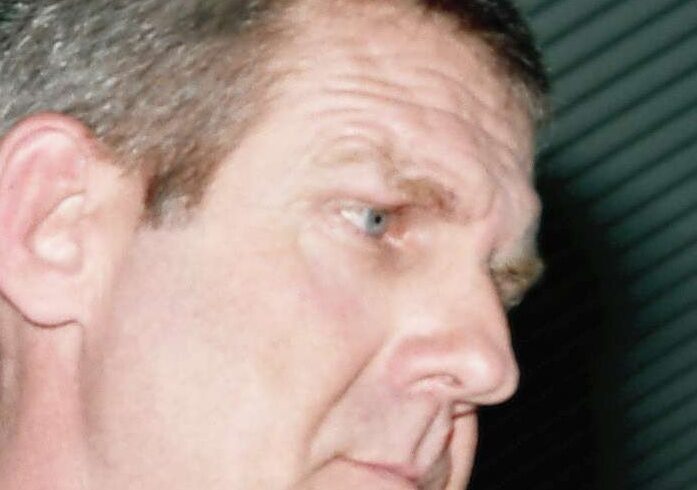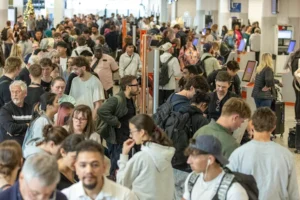
In the wake of outback killer Bradley John Murdoch’s death, the police officer first on the scene of Peter Falconio’s disappearance has spoken exclusively to the ABC about the cold case that captured the world.
Murdoch died overnight in Alice Springs Hospital, while serving a life prison sentence for the murder of Mr Falconio near the remote Northern Territory town of Barrow Creek on July 14, 2001.
NT Police Senior Sergeant Erica Gibson was working in Alice Springs 24 years ago when the “bizarre radio transmission” came through in the middle of the night.
“A truck driver had located a female who claimed to have had her and her partner’s vehicle ambushed and stolen,” she said.
“It was really unbelievable, it was just so different to the kinds of jobs that we would normally be responding to.”
A missing person poster for Peter Falconio, pictured at Barrow Creek in 2001. (AAP: Rod McGuirk)
It was so far removed from the ordinary police duties in Central Australia that the then-shift sergeant went back to the communications officer to double-check the message.
“It was certainly an actual incident and a response would be required,” she said.
Over the next few hours and with the resources available at the time, Senior Sergeant Gibson travelled to Barrow Creek with the knowledge Murdoch could still be there.
“So, were we driving towards the potential for an armed offender to be driving at us?” she said.
“The Stuart Highway, in that particular location, is very remote with limited communications.”
Erica Gibson interviewed Ms Lees after the incident. (ABC News: Roxanne Fitzgerald)
Senior Sergeant Gibson arrived at Barrow Creek Hotel, 300 kilometres north of Alice Springs, where she first met Mr Falconio’s partner, Joanne Lees, who was “absolutely shell-shocked”.
She said Ms Lees wasn’t “hysterical or overtly emotional”, but acknowledged that victims of crime “express their trauma and emotion in a different way, so it wasn’t for me to judge how she reacted”.
They began speaking, and the hotel manager offered his word processor for the sergeant to record the victim’s statement.
Joanne Lees, pictured here in Darwin ahead of Murdoch’s murder trial, provided evidence that proved crucial to his conviction. (Glenn Campbell: Reuters)
“I invested a number of hours taking a typed statement on this word processor,” Senior Sergeant Gibson said.
“About two-and-a-half or three hours into it, there was a power surge and everything that I had captured was lost.
“The investigative team at that time, in Alice Springs, was not happy.”
They started over again with an identical written statement, which the police officer described as “horrific” and “so traumatic” for Ms Lees.
It was clear from those early conversations that Mr Falconio was either missing or dead, but Senior Sergeant Gibson said she had no idea how huge the case would become.
“It’s certainly not something that happens every day, or even every year, so the enormity of this incident certainly came to mind,” she said.
“It was a long, hard day and night — not only for the police who were responding but also, most importantly, for Joanne.”
The police officer who was first on the scene at Barrow Creek, after Peter Falconio and Joanne Lees were ambushed by Bradley John Murdoch, has spoken exclusively to the ABC about the experience. (AAP: Dave Hunt)
People across Alice Springs became “involved in this investigation, in one way or the other”, from local businesses trying to help, through to tourists exhibiting a heightened awareness of personal safety.
Policing became “so much more intense” than Senior Sergeant Gibson had been used to, with the case drawing attention to Alice Springs and the police response provided at the time.
“24 years ago, Alice Springs was a different place,” she said.
“It changed the town, people became more hypervigilant.”Loading…
Joanne Lees then and now
Ms Lees escaped Murdoch after he ambushed the British couple on that fateful night but faced false allegations she was involved in her boyfriend’s murder.
She described herself as the victim of an attempted rape and murder, declining offers from media — both Australian and English outlets — that were eager to cover the story.
Joanne Lees and Peter Falconio were travelling in the Northern Territory when Bradley John Murdoch ambushed the British couple. (AAP)
Former ABC journalist Liv Casben covered the Murdoch court case 20 years ago, which she said was “a harrowing experience for Joanne Lees”, who maintained an “intensely private nature” amid “an immense amount of pressure” from both the media and public.
“She subsequently told her story in a book called No Turning Back, where she says she is not a victim or witness anymore,” Ms Casben said.
The book was published in 2006, described at the time by Ms Lees as “the full truth, not simply a journalistic take on what happened, glossed and distorted to make it as sensational as possible”.
Loading…
Today Peter’s parents, Luciano and Joan Falconio, live about 9 kilometres from Ms Lees and her hometown of Huddersfield in the United Kingdom, according to News Corp.
In a recent interview, Mr Falconio said his family was still in occasional contact with her.
“I haven’t seen Joanne for quite a while,” he told News Corp.
“I know where she lives — if I need anything, I can call.”
Mr Falconio said the last time he spoke to Ms Lees was about 12 months ago.
Joan and Luciano, pictured here leaving the NT Supreme Court almost 20 years ago as Murdoch’s murder trial was heard in Darwin. (AAP: Paul Benjafield)
In a statement to the ABC, Peter’s parents Luciano and Joan Falconio thanked the Northern Territory Police “for the support and continuing efforts to investigate our son’s murder”.
“Upon hearing that Bradley John Murdoch had died our first feeling was of relief, it’s like a weight that’s been lifted,” they said.
“We are only forced to think about him now that he’s died, we don’t want to let him to ruin our lives more than he already has.”
The grieving parents said while “they didn’t have much faith”, they were hoping Murdoch would “reveal where Peter was before he died”.
“But even now, we still hold out hope that his remains will be found.”





